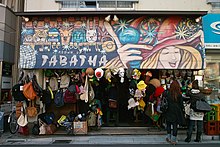Shimokitazawa (下北沢, Shimokitazawa) is a neighborhood in Setagaya, Tokyo, Japan. It is located in the southwestern corner of the Kitazawa district, hence the name "Shimo-kitazawa" (literally lower Kitazawa). Also known as "Shimokita", the neighbourhood is well known for the density of small independent fashion retailers, cafes, theaters, bars and live music venues.



Independent retail
editThe neighbourhood is often compared with the backstreets of Ura-Harajuku and Koenji; smaller shop units and restricted vehicular access has limited its appeal to larger domestic and international fashion merchandisers, enabling independent retailers to survive. The district consists of the streets immediately surrounding Shimo-Kitazawa Station, where the Odakyu Electric Railway and Keio Inokashira Lines intersect. The neighbourhood has long been a center for stage theater and live music venues; serves as a home to the historic Honda Gekijō theater and holds theatre festivals throughout the year. With numerous cafes, secondhand and vintage fashion[1] and recorded music outlets, Shimokitazawa remains popular with students and followers of Japanese youth subcultures.[2]
Redevelopment
editIn 2004, the Setagaya City Council released a plan to redevelop a large section of the city, including the construction of several high rise buildings, and extending Route 54 across the city. The streets are very narrow and highly intersected, with many small alleyways. Because many residents and visitors consider this to be part of the charm of Shimokitazawa, some controversy surrounds the development plan, which some saw as degrading and crassly commercialized. [3][4]
With the relocation of the Odakyu Line rail tracks underground in March 2013, new station entrances, along with fully doubled tracks in both directions, larger scale redevelopment of the immediate Shimo-Kitazawa Station area is ongoing. The infamous Odakyu rush hour crunch has been reduced to 150% of train load as of 2018 from nearly 200% previously.
In popular culture
editA Midsummer Night's Wet Dream (Japanese: 真夏の夜の淫夢, Hepburn: Manatsu no Yo no Inmu), a porn produced by Coat Corporation, gained public attention in 2002 after professional baseball player Kazuhito Tadano was found to be in the cast. Soon after the founding of Japanese video-sharing website Niconico in 2007, Internet users began to upload video mash-up parodies mocking this scandal. The central figure of Inmu videos is Yaju Senpai (Japanese: 野獣先輩), an actor appearing in the original porn, who is parodied the most.
Shimokitazawa serves as the primary setting of the manga series Bocchi the Rock! and its anime adaptation. The popularity of this series has contributed to increased tourism in the area to the point the characters are appointed as ambassador of the area to promote the activities such as Shimokitazawa Curry Fest.[5][6][7]
See also
editReferences
edit- ^ Joy, Alicia (9 February 2017). "Best Vintage Shops in Shimokitazawa". Culture Trip.
- ^ Kawamura, Yuniya (2012). Fashioning Japanese Subcultures. Berg Publishers / Bloomsbury. p. 93. ISBN 9780857852151.
- ^ Save the Shimokitazawa Archived 2007-03-23 at the Wayback Machine
- ^ "Splitting a Hip Neighborhood, in More Ways Than One" by Martin Fackler, The New York Times, October 1, 2006.
- ^ Michel, Patrick St (2023-02-17). "Bocchi the Rock: Real Life Anime Locations in Shimokitazawa". Tokyo Weekender (in Japanese). Retrieved 2023-04-20.
- ^ "Bocchi the Rock! Fans Visit Series' Real-Life Locations in Tokyo". epicstream.com. Retrieved 2023-04-20.
- ^ クロダマサノブ (2023-09-12). "ぼっち・ざ・ろっく!結束バンドが下北沢公認アンバサダーに!!116店参加『下北沢カレーフェスティバル 2023』10/5-22開催". 下北沢情報サイト【しもブロ】 (in Japanese). Retrieved 2023-09-12.
External links
edit- Media related to Shimokitazawa at Wikimedia Commons
- Shimokitazawa (JNTO)
- Go Tokyo Travel Guide
- Shimokitazawa Music Festival (Japanese)